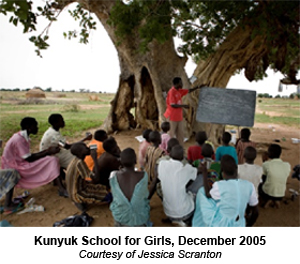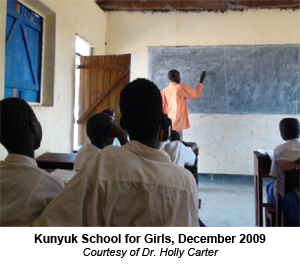| Winter 2010-2011 |

|

|

|
 A Women-Led Humanitarian and Human Rights Initiative WINTER 2011An Update on the State of Sudan
January 9, 2011 will mark a signature moment in Sudan’s tortuous history as Southerners take to the polls to cast their ballots on the question of separation. After decades of laboring under what they consider an oppressive Khartoum-based government, most Southerners are calling for the birth of Africa’s newest independent country. Escalating tension leading up to the referendum and increased concern about renewed violence, have appropriately provoked Sudan-watchers from President Barack Obama to celebrity George Clooney into a state of high alert. We need your generous partnership more than ever. To avert more tragedy, our sisters throughout Sudan and the Diaspora have asked that we increase our support of their tireless efforts to chip away at the barriers of race, religion, ethnicity and geography that have pitted Sudanese against one another for generations. We can increase our support if you will increase your giving. “Even if we are two countries,” they remark, “we must learn to live side by side in peace.” Together, diverse women are relentlessly forging multiple pathways to sustainable peace—from bold advocacy and activism through our Sisterhood for Peace initiative to girls’ education at the Kunyuk School for Girls and women’s literacy at our Women’s Peace School. We’re happy to update you on the awesome progress of these three projects that you’ve made possible. Juba 2010: Sisterhood for Peace Resurrecting Hope Thanks to help from faithful supporters like you, in July 2010, 70 dynamic grassroots peacebuilders gathered in Juba, South Sudan for our 5th leadership forum. The group included women from 13 Sudanese states, Abyei and Chad, as well as 7 Sudanese Diaspora delegates from the US and Canada. We were delighted to partner with colleagues from the US Institute of Peace and Institute for Inclusive Security to provide training in conflict management, strategizing and action planning focused on addressing Sudan’s multiple crises. The success of the conference far exceeded our expectations. Many participants had never before shared space with so many diverse women and saw the gathering as historic. Not only were they eager to share their own experiences as peacebuilders, but also to learn from one another.
During the event, Zeinab was interviewed by our Program Director, Sarah Rial, and videotaped while recounting her experiences. Although she is fluent in English, Zeinab insisted on speaking in Arabic, saying she has many interviews in English, but none in Arabic. Her heart’s desire was to record an interview that her sisters in Sudan could understand. Women encircled Zeinab, rapt with intrigue as she described crises she endured. Many women from other troubled regions of Sudan have experienced similar crises—multiple detentions and arrests, surviving in Internally Displaced Persons camps, a husband who was arrested, disappeared and assumed dead leaving her to raise their infant daughter alone. “Nevertheless sisters, you must wipe away your tears,” the wise stalwart counseled. “We must work for peace.” “Sisterhood” of Peacemakers in Sudan Calls for Renewed Attention to Darfur This article on the recent Peace Conference in Juba is reprinted by permission from Laura Heaton, writer/editor of the blog, Enough Said, at the Enough Project, a campaign of the Center for American Progress. It was originally posted on Change.org on October 7, 2010.
This is the collective message that a group of 70 female civil society leaders from Sudan and Chad urgently want leaders of Darfur’s rebel groups to hear. “We want you to remember that every day a young woman is raped, and another leaves school. We have already lost a generation and do not want to lose other generations,” they wrote in a letter addressed to rebel leaders during a peace-building workshop in July. Two months later, the women have returned to their homes – or at least to their temporary homes, for many of the women have been displaced by violence – and are gathering signatures from other women in their communities. So far, more than a thousand women have signed the letter – and many men have wanted to, according to the participants. Brought together by My Sister’s Keeper, and supported by the U.S. Institute for Peace and the Institute for Inclusive Security, women traveled from Chad, Abyei, Red Sea State, Khartoum, and Southern Kordofan to meet in Juba for a week-long peacebuilding workshop. “My personal hope from this letter-writing campaign is that it will succeed in putting pressure in all rebel leaders to pay attention to what is happening on the ground in their communities as they go to war,” said Amna, one of the conference attendees. Right now the peace process has stalled in large part because the rebel groups are not united in their grievances against the Sudanese government, said Amina, another participant. “There is no trust between the negotiating parties, and most of them have a hidden agenda, even the government. So when they sit together around a table for negotiation, each only has in mind his own tribe and how much he can win,” she said. The women participating in the Sisterhood for Peace initiative, a project of My Sister’s Keeper, want to address the stalemate from multiple angles. In addition to the letter to the rebel leaders, they drafted one for lead mediator Djibril Bassolé and one to First Lady Michelle Obama. They call for “strong and neutral mediation” to “restore the confidence of the parties” so that negotiations will be inclusive and productive.
But as the sentiments of the Sisterhood for Peace participants illustrates, patience with this refusal to participate in peace talks has also faded. “Our eyes are dry from crying over what has happened to our families. … [W]e are exhausted from the persistence of the war with the ongoing killing, violation and absence of security,” the women wrote. But months later, as the list of signatures on the letters grows, participants say that they feel renewed optimism in the strength of their message of peace when they band together, particularly in light of the only limited role women have played in peace processes in Sudan. “When [the participants] arrived at the conference they seemed just so beat-down; you could feel the despair and sense of powerlessness,” said Gloria White-Hammond, executive director of My Sister’s Keeper. But between watching the film Pray the Devil Back to Hell about women peacemakers in war-torn Liberia, meeting and learning about the accomplishments of the Sisterhood for Peace’s Diaspora delegates, participating in the trainings, hearing the testimonies from women peacebuilders in South Sudan and Nuba Mountains, there was a distinct shift in outlook. While the Sisterhood for Peace participants continue to solicit support for their message in their communities, the organizers are working to find channels to get the letters into the hands of each of the rebel leaders, the mediation team, and to set up a meeting with Mrs. Obama. As White-Hammond said, “I would say the headline for this conference is ‘Hope Resurrected!’ ” Next Stop for My Sister’s Keeper: Nuba Mountains, Southern Kordofan State and Beyond!
An additional source of tension is the implementation of the process known as Popular Consultation. This grassroots peace process is common in other parts of Africa and post conflict regions, but is new to Sudan. It’s designed to facilitate reconciliation and to encourage sustainable peacebuilding. In compliance with the CPA, Popular Consultation (known as PopCon) is the method by which the various stakeholders in SKS will arrive at an agreement that addresses the root causes that fueled their participation on opposing sides of the two-decade North-South civil war and which continue to ignite conflicts. Throughout our Juba 2010 conference, many participants, especially our sisters from the Nuba Mountains voiced concern about the volatility of SKS. At the invitation of Zeinab Balandia of Ru’ya (see page 1), Najwa Konda of Nuba Relief, Rehabilitation and Development Organization and other women from Nuba Mountains, My Sister’s Keeper agreed to conduct a forum in SKS in December 2010. The conference, “Building Pathways to Sustainable Peace in Southern Kordofan”, will convene 30 diverse grassroots women leaders from throughout the state for training in cross-cultural communication and consensus building, which are skills essential to the success of PopCon. We’ll also develop action plans to ensure women’s inclusion in all aspects of the PopCon process. The need to prevent “the next Darfur” is critical. As the ICG report observes, “More is at stake than the prevention of a local conflict. The fate of peacebuilding in this front-line state will say much about the viability” of Sudan’s other peace processes in Darfur and beyond. Concerns about “the fate of peacebuilding” throughout Sudan underscore the urgency of our efforts to support the growing movement of Sudanese women peacebuilders. During the past 3 years, we’ve connected with over 250 women in the Diaspora and inside Sudan for training in conflict management and action planning. Affirmed in their power to effect change, these women are now taking action together. By making your year-end gift today, you’ll help us expand our Sisterhood for Peace initiative inside Sudan. We’ll be able to hire 2 Juba-based staffers who will: 1) strengthen old partnerships and develop new partnerships with other Sudan-based organizations involved in peacebuilding; 2) provide training in conflict management and action planning to women in other vulnerable areas inside Sudan; and 3) provide follow-up support for the critical peacebuilding actions the women devise. Building Educational Pathways to Sustainable Peace: Phase II—Teacher Training
In December 2005, the resourceful teachers at the Kunyuk School in rural Akon, South Sudan, were writing on portable blackboards poised against the trunk of a centuries-old kunyuk tree. This classroom was far from ideal with frequent distractions and, on rainy days—no school! Thanks to faithful partners such as you, today teachers are preparing Sudan’s next generation of women peacebuilders in fully outfitted classrooms! The 4-building campus is bustling with 525 Kunyuk primary school students, as well as 200 women in our adult literacy program, the Women’s Peace School. What’s next? Constructing the school was Phase I; developing the teachers is Phase II. Recently, Board Member and Chair of the Department of Education at Northeastern University, Dr. Holly Carter, conducted a needs assessment of the 12 teachers at Kunyuk and the 3 teachers at the Peace School. She observed that the lead teachers were generally strong, noting that Kunyuk Headmaster, Dominic Deng Dau; Peace School Coordinator, Angelo Wol; and Regional Educational Supervisor, Philip Lual Bol, “have a confident and effective pedagogy in the classroom”. However, with regard to the remainder of the staff, Dr. Carter confirmed what many evaluators have concluded of most teachers throughout post-conflict South Sudan—they “require extensive training and professional development support in content knowledge and pedagogy”. According to Philip and Angelo, the level of effectiveness observed by Dr. Carter, was enhanced by their participation in the Pan African “Reading for All” Conference in Tanzania in August 2009. Their attendance was made possible by our Boston-based partner, the AMETI group. AMETI, comprised of congregants from Bethel AME Church and Temple Israel (TI), includes several Boston schoolteachers. Led by retired teacher and long-time Sudan activist, Judith Baker, a delegation of 12 teachers raised $3500 for Phillip and Angelo to join them at the “Reading for All” Conference. These two head teachers considered their interaction with their Boston peers and educators from throughout the African continent to be transformational. They returned with treasured teaching materials and exciting ideas which they have since shared with teachers throughout the region. For instance, to enliven extracurricular activities, Kunyuk’s new Agricultural Club is raising vegetables while raising money for school activities. There are also new Debate and Book Clubs. And Angelo has enhanced the adult literacy curriculum with new materials. Now Philip and Angelo and the entire teaching staff are eager for an ongoing teacher development program. The impact that Philip and Angelo identified after participating in the Tanzania conference is an indication of the potential of such a program. With your support, we can make it happen! We’ve established three educational goals for 2011: 1) hire an Akon-based project director to coordinate our educational initiatives; 2) develop partnerships with other Sudan-based organizations in the education sector to provide professional development for our teachers; and 3) align our Sisterhood for Peace initiative with a peacebuilding project at the Kunyuk and Women’s Peace Schools. Your year-end gift will help us meet these goals. Give Peace A Chance by Giving A Gift Today! Thank you in advance for your generous contribution to equip more Sudanese women as effective peacebuilders and to further invest in teacher training and student learning at the Kunyuk and Women’s Peace Schools. Together, we are restoring dreams and redeeming promise throughout Sudan!
For more information, please contact us at 215 Forest Hills Street, Boston, MA 02130-3302; |
|||


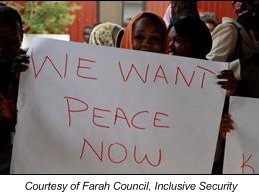
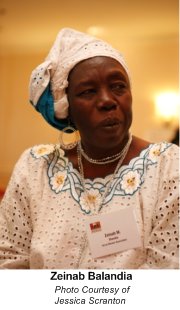 One special evening, we highlighted the work of our participant, Zeinab Balandia, the founder of Ru’ya Association based in the Nuba Mountains region of Southern Kordofan State. Zeinab recruits and trains diverse grassroots women to become peacemakers in troubled Southern Kordofan, where tension among diverse tribes has fueled conflicts for generations. In 2009, Zeinab received the Women’s Peacemaker Award from the Joan B. Kroc Institute for Peace and Justice at the University of San Diego.
One special evening, we highlighted the work of our participant, Zeinab Balandia, the founder of Ru’ya Association based in the Nuba Mountains region of Southern Kordofan State. Zeinab recruits and trains diverse grassroots women to become peacemakers in troubled Southern Kordofan, where tension among diverse tribes has fueled conflicts for generations. In 2009, Zeinab received the Women’s Peacemaker Award from the Joan B. Kroc Institute for Peace and Justice at the University of San Diego.
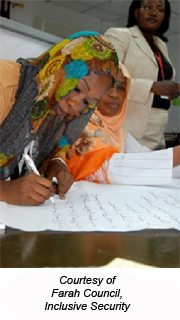 “We, the women of Darfur, have united to heal the wounds. We have built our power. It is time for the Darfurian movements to unite."
“We, the women of Darfur, have united to heal the wounds. We have built our power. It is time for the Darfurian movements to unite."
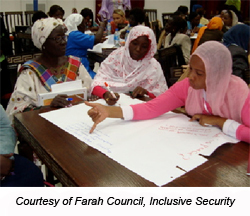
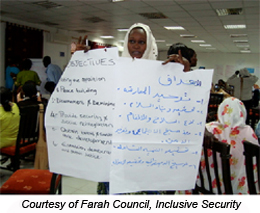 Darfur peace talks restarted this week between the Sudanese government and one coalition of Darfur rebels, the Liberation and Justice Movement, which formed in February when the latest round of negotiations got underway in Doha. According to news reports from Doha today, the two sides agreed to finish their negotiations by October 19 and finalize a draft peace to circulate between all the rebel movements shortly thereafter. However, optimism about the Doha talks has waned because the two rebel groups who wield the most firepower and support among Darfuris pulled out or refused to participate.
Darfur peace talks restarted this week between the Sudanese government and one coalition of Darfur rebels, the Liberation and Justice Movement, which formed in February when the latest round of negotiations got underway in Doha. According to news reports from Doha today, the two sides agreed to finish their negotiations by October 19 and finalize a draft peace to circulate between all the rebel movements shortly thereafter. However, optimism about the Doha talks has waned because the two rebel groups who wield the most firepower and support among Darfuris pulled out or refused to participate.
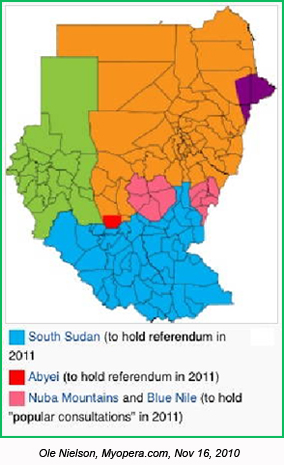 While the urgencies of Darfur (green on the map) and Southern Sudan (in blue) often loom larger in the minds of the international community, the crisis in the Nuba Mountains of Southern Kordofan State (the pink area in central Sudan) is no less acute. In its October 2008 report, the International Crisis Group (ICG) identified Southern Kordofan State (SKS) as, potentially, “the next Darfur.” SKS is on the border between Northern and Southern Sudan and is yet another volatile zone marked by ethnic hostilities between indigenous African tribes (mainly Nuba) and Arab tribes (mainly Misserya and Hawazna). These tensions have been exacerbated by speculations about the resumption of post- referendum conflicts.
While the urgencies of Darfur (green on the map) and Southern Sudan (in blue) often loom larger in the minds of the international community, the crisis in the Nuba Mountains of Southern Kordofan State (the pink area in central Sudan) is no less acute. In its October 2008 report, the International Crisis Group (ICG) identified Southern Kordofan State (SKS) as, potentially, “the next Darfur.” SKS is on the border between Northern and Southern Sudan and is yet another volatile zone marked by ethnic hostilities between indigenous African tribes (mainly Nuba) and Arab tribes (mainly Misserya and Hawazna). These tensions have been exacerbated by speculations about the resumption of post- referendum conflicts.
